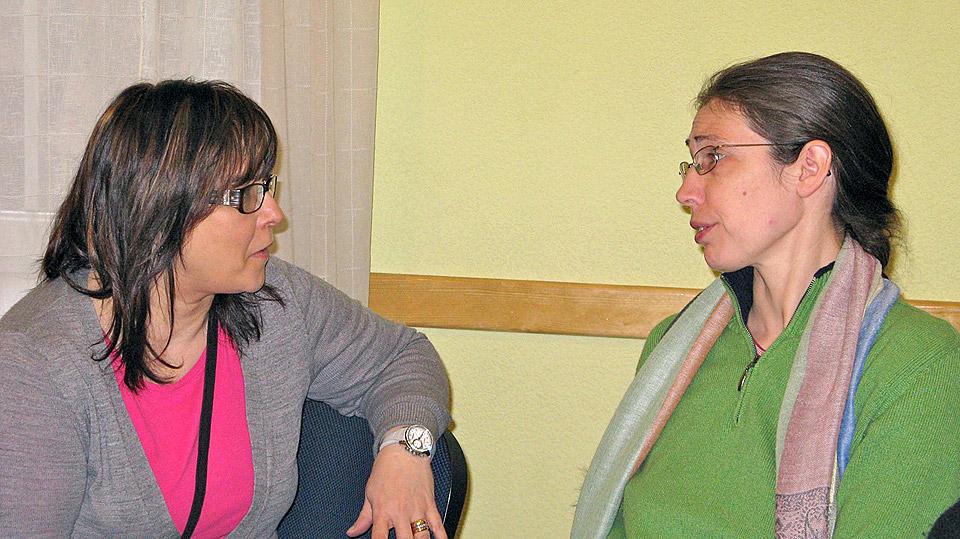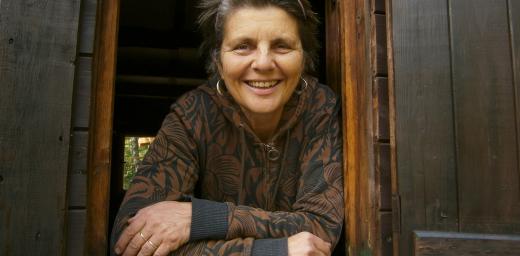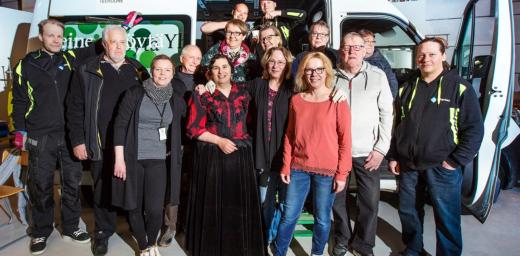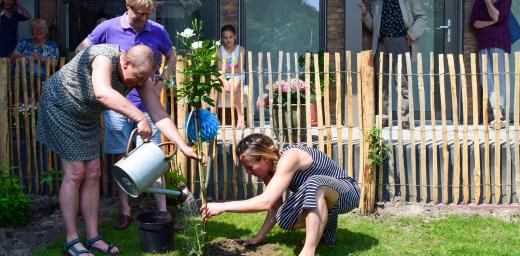Lutheran Diaconal Workers Define a Holistic Framework for Diakonia in Europe

Ms Marjut Lukkarinen from Finland (left) and Rev. Daniela Schwimbersky from Austria, in a discussion at the diakonia workshop in Odessa. © LWF/Anli Serfontein
“Conviviality” Concept to Guide Approaches in Diverse Contexts
A broad framework for an action plan on reforming community diakonia in the aftermath of the financial crisis affecting most of Europe since 2008 has been agreed by a core group of Lutherans working in this field.
The outline adopted by representatives from all three European regions of The Lutheran World Federation (LWF) incorporates practical actions with a combined strategy to achieve a more holistic approach to diakonia (church social service) for diaconal workers and decision-makers in churches in Europe.
The “solidarity group” of diaconal workers and educators from 14 European countries agreed on the implementation process at a workshop in Odessa, Ukraine, 16-19 January, part of a series that began in December 2011 under the theme, “Seeking Conviviality – Re-forming Community Diakonia in Europe.” The LWF Europe Desk at the Department for Mission and Development (DMD) coordinates the initiative in collaboration with the International Academy for Diakonia and Social Action (interdiac) in Český Těšín, Czech Republic.
The workshop participants emphasized “conviviality” as a key concept for diakonia in Europe. The term implies that the foundation of communities is based on reciprocal relationships between people, while undergirding respect for both people and communities that are “different.” Diakonia, they noted, “is rooted in congregational life and congregational life is community life.”
They underlined that while the LWF represents one church communion, the context of Lutheran churches is diverse and includes many different realities. They affirmed the group’s working process as a participatory approach that helps to build trust between the respective individuals and commitment to the overall process. It also enhances a deeper understanding of the issues faced in each context, while providing space for mutual learning and critical review.
In Odessa, participants prepared individual action plans and established partnerships to help them implement findings in the ongoing process. They suggested that the final report and action plan take into account the different situations in Europe and incorporate individual and common project plans that link social justice issues to a just economy.
Learning among Participants
Interdiac’s head of education Rev. Tony Addy emphasized that the main outcome of the Odessa workshop was not only the preparation of action plans by each participant and mapping out the general concepts and methodologies. “We deepen the relationship and learning between the participants and we get the real learning from Eastern Europe, not as a marginal note but as a central part of the process. Eastern Europe has a much more equal voice,” he said.
Addy noted that the group started its work from a position where it had to integrate different approaches. He cited concepts in countries such as Germany, with a continuous 150-year tradition of organized diakonia, compared to Eastern Europe, where this tradition was interrupted during the communist era when church social service existed primarily through informal congregational and personal involvement. In these countries, organized diakonia only could begin to redevelop after the fall of the Iron Curtain that had divided Europe for over four decades, he said.
For Janka Adameova, interdiac manager, the workshop had brought a deeper understanding between the three regions—Central Eastern Europe, Central Western Europe and the Nordic countries. Until now, there was only one general understanding of diakonia which was introduced mainly by partners in Western Europe. “Eastern European countries used to be under represented,” she said.
Adameova also called for a broader definition of what Europe entails beyond the European Union. This regional perspective should also include the Ukraine, Armenia and Georgia as well as parts of Russia, she added.
The action plans include an overall strategy to bring the findings of the process so far into the LWF structures at the European level, and to countries that are not represented in the solidarity group.
Gunnel Claesson from the Church of Sweden echoed the views of many participants when she said “We do not want this document to sit on a shelf; it should be used in the field.”
Rev. Dr Eva Sibylle Vogel-Mfato, LWF area secretary for Europe said the next phase in the process is crucial as it involves applying the methodologies identified for the respective action plans.
“Participants will now bring back to their local, political and structural church levels the approaches and methodologies to diakonia identified in the process. At our next meeting, we will look at what has worked, what could not be achieved as planned and why, and build strategies that will help bring about meaningful change to marginalized people and communities,” she added.
The group will hold its next workshop in January 2014.
(Written for LWI by Berlin-based journalist Anli Serfontein)





